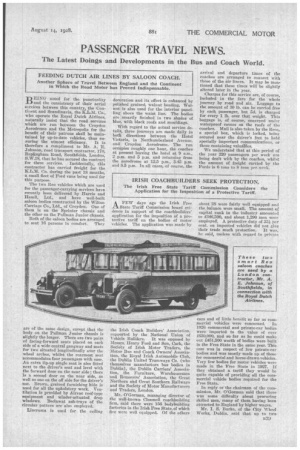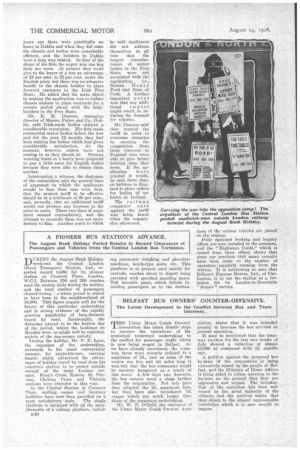IRISH COACHBUILDERS SEEK PROTECTION.
Page 65

Page 66

If you've noticed an error in this article please click here to report it so we can fix it.
The Irish Free State Tariff Commission Considers the Application for the Imposition of a Protective Tariff.
APEWdays ago the Irish Free State Tariff Commission heard evidence in support of the coachbuilders" application for the imposition of a protective tariff on the bodies of motor vehicles. The application was made by the Irish Coach Builders' Association, supported by the National -Union of Vehicle Builders. It was opposed by Messrs. Henry Ford and Son, Cork, the Society of Irish Motor Traders, the 'Motor Bus and Coach Owners' Association, the Royal Irish Automobile Club, the Dublin United Tramways Co. (who themselves manufacture bus bodies in Dublin), the Dublin Carriers' Association, the Furniture, Warehousemen and Removers' Association, the Great Northern aild Great Southern Railways and the Society of Motor Manufacturers and Traders, London.
Mr. O'Gorman, managing directorof the well-known Clonmell coachbuilffing firm, said there were 156 bodybuilding factories in the Irish Free State, of which five were well equipped. Of the others about 28 were fairly well equipped and the, balance were small. The amount of capital sunk in the industry amounted to 1346,500, and about 1,290 men were employed. A protective duty of 331 per cent. on imported vehicles did not give their trade much protection. It was, he said, useless with regard to private cars and of little benefit so' far as commercial vehicles were concerned. In 1926 commercial and private-car bodies were imported to the value of over 1630,000, and so far as he could make out 1.451,500 worth of bodies were built in the Free State in the same year. This sum was in respect of few private-car bodies and was mostly made up of those for commercial and horse-drawn vehicles. Very few bodies for motor vehicles were made in the Free State in 1927. If they obtained a tariff they would be quite capable of providing all the commercial vehicle bodies required for the Free State.
• In reply to the chairman of the commission, Mr. O'Gorman said that there was some difficulty about procuring skilled men, many of them having been attracted to Englaed by higher wages.
Mr. I. S. Burke, of the City Wheel Works, Dublin, said that up to two years ago there were practically no buses in Dublin and when they did come the chassis and bodies were remarkably efficient, and the builders in Dublin were a long way behind. In four of the shops of his firm the onput was one bus body per week. At present they could give to the buyer of a bus an advantage of 15 per cent. to 22 per cent, under the English price but there was no adequate benefit to the chassis builder to place forward contracts in the Irish Free State. He added that the main object in making the application was to induce chassis makers to place contracts for a certain period ahead with the bodybuilders in the Free State.
Mr. H. M. Dawson, managing director of Messrs. Potter and Co., Dublin, said Irish-made bodies enjoyed a considerable reputation. His firm made commercial motor bodies before the war and for the past 12 months they had been making bus bodies which had given
considerable satisfaction. • At the moment, however, orders were not coming in as they should ,he. Persons wanting buses in a hurry were prepared to pay a little more for English bodies because they were able to obtain, then quicker.
Interrupting a witness, the chairman of the commission said the general lines of argument on which the applicants sought to base their ease were, first, that the present tariff to be effective -should be at a minimum of 50 per cent., and, secondly, that an additional tariff would not produce any increase in the price to users. These two lines of argament seemed contradictory, and the attempt to reconcile them was net satisfactory to him. Another point to which
he said applicants did not address themselves at all was that the largest manufacturers of motor bodies in the Free State were not associated with the application, i.e., Messrs. Henry Ford and Sons of Cork. A further important point was that any additional impost might result in reducing the demand for vehicles.
Mr. Dawson said they wanted the tariff in order to overcome obstacles in meeting the competition from large concerns in England who were able to give better delivery than they were. If the application were granted it would; he said, farce chassis builders in England to place orders for bodies of yehides in Ireland.
The railway companies' case ' against the tariff was being heard when the commis; sion adjourned.




















































































































